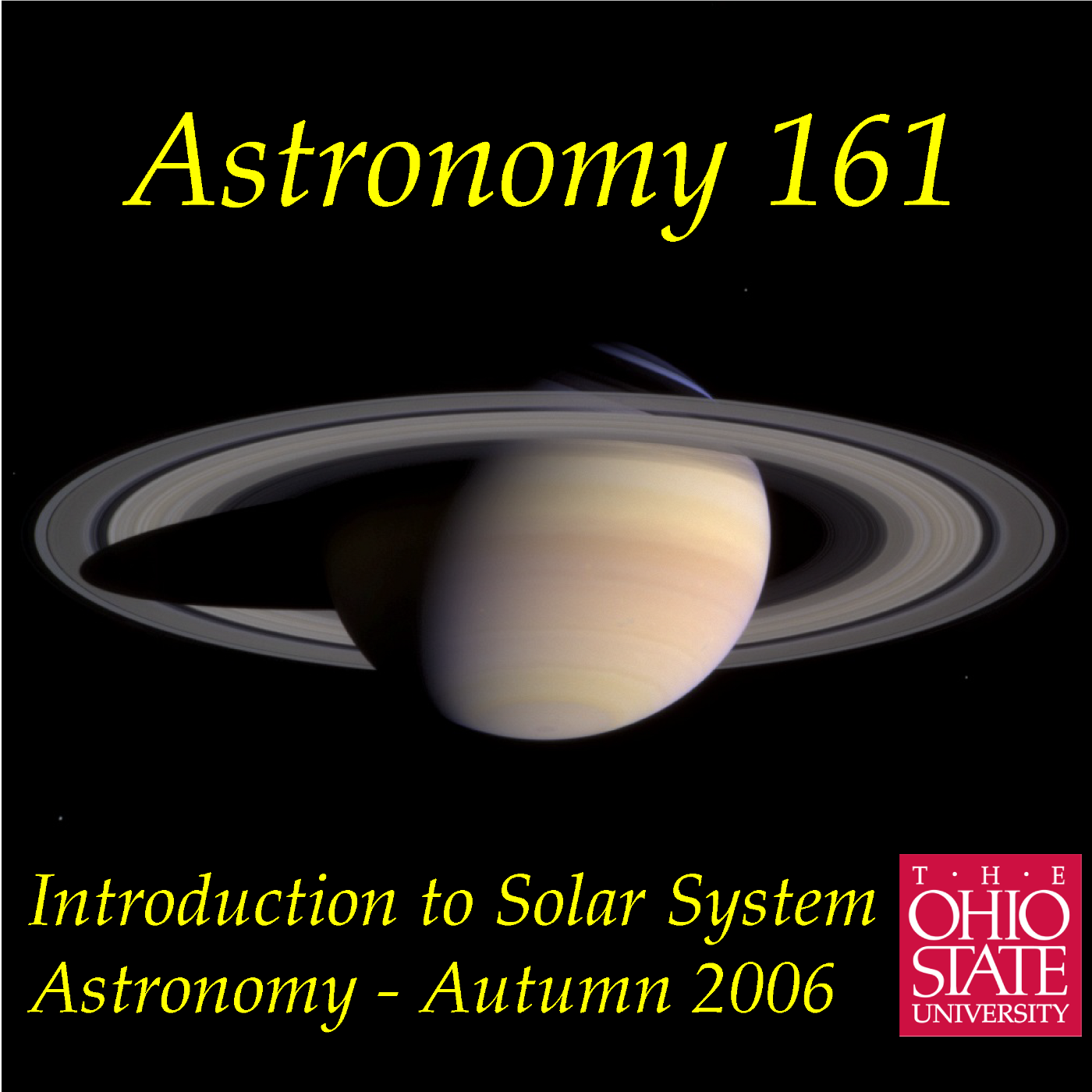Podcast Profile: Astronomy 161 - Introduction to Solar System Astronomy
 Site • RSS • Apple Podcasts
Site • RSS • Apple Podcasts47 episodes
2006 to 2009
Collection: Physics, Math, and Astronomy

 Site • RSS • Apple Podcasts
Site • RSS • Apple PodcastsDescription (podcaster-provided):
Astronomy 161, Introduction to the Solar System, is the first quarter ofThemes and summary (AI-generated based on podcaster-provided show and episode descriptions):
➤ Intro solar-system astronomy lectures • sky mapping, celestial coordinates, motions • seasons, Moon phases, eclipses • timekeeping, calendars • planetary motion models, Copernican revolution • Newtonian gravity, orbits, tides • light, atoms, spectroscopy, telescopes • Earth/Moon geology, atmospheres • solar-system formation • planets, moons, rings, asteroids, comets, Kuiper Belt, Pluto definition • exoplanet detectionThis podcast presents live classroom lectures from an Ohio State University introductory course on solar system astronomy for non-science majors. Across the series, the instructor builds the foundational “toolkit” used in astronomy, starting with scientific notation, metric units, and key distance measures such as the astronomical unit and light-year. Listeners are then guided through how the sky is mapped and described, including constellations, celestial coordinates, and the apparent motions produced by Earth’s rotation and orbit. Several lectures connect astronomy to everyday experience through explanations of seasons, lunar phases, eclipses, and the astronomical roots of timekeeping, time zones, and calendar systems.
A major theme is how models of the cosmos developed historically and scientifically. The lectures trace the transition from ancient geocentric frameworks to heliocentric ideas, and then to the physics that explains planetary motion, emphasizing the contributions of figures such as Copernicus, Tycho, Kepler, Galileo, and Newton. Core physical concepts—laws of motion, universal gravitation, orbital mechanics, and tides—are presented as the basis for understanding how bodies move and evolve in the solar system.
The podcast also introduces the observational and physical methods astronomers use, including the behavior of light, the Doppler effect, atomic structure, spectroscopy, and telescope technology. The latter part of the course surveys the solar system’s major worlds and small bodies—Earth, the Moon, terrestrial planets, gas and ice giants, moons, rings, asteroids, comets, and Kuiper Belt objects—linking their properties to solar system formation and evolution. The series concludes by discussing planet definitions and the detection of planets around other stars.
| Episodes: |
|
Welcome to Astronomy 161 2006-Sep-18 |
|
Lecture 2: Astronomical Numbers 2006-Sep-21 |
|
Lecture 3: The Starry Night 2006-Sep-22 |
|
Lecture 4: Measuring the Earth 2006-Sep-25 |
|
Lecture 5: Mapping Earth and Sky 2006-Sep-26 |
|
Lecture 6: Daily and Annual Motions 2006-Sep-27 |
|
Lecture 7: The Four Seasons 2006-Sep-28 |
|
Lecture 8: Phases of the Moon 2006-Sep-29 |
|
Lecture 9: Eclipses of the Sun and Moon 2006-Oct-02 |
|
Lecture 10: Telling Time 2006-Oct-03 |
|
Lecture 11: The Calendar 2006-Oct-04 |
|
Lecture 12: The Wanderers - Planetary Motions 2006-Oct-05 |
|
Lecture 13: Greek Astronomy 2006-Oct-09 |
|
Lecture 14: The Revolutions of Nicolaus Copernicus 2006-Oct-10 |
|
Lecture 15: The Watershed: Tycho and Kepler 2006-Oct-11 |
|
Lecture 16: Galileo and the Telescope 2006-Oct-12 |
|
Lecture 17: On the Shoulders of Giants: Isaac Newton and the
Laws of Motion 2006-Oct-13 |
|
Lecture 18: The Apple and the Moon - Newtonian Gravity 2006-Oct-16 |
|
Lecture 19: Orbits 2006-Oct-17 |
|
Lecture 20: Tides 2006-Oct-18 |
|
Lecture 21: The Rotation and Revolution of the Earth 2006-Oct-19 |
|
Lecture 22: Light the Messenger 2006-Oct-23 |
|
Lecture 23: Worlds Within: Atoms 2006-Oct-24 |
|
Lecture 24: Matter and Light 2006-Oct-25 |
|
Lecture 25: Measuring Light - Spectroscopy 2006-Oct-26 |
|
Lecture 26: Telescopes 2006-Oct-27 |
|
Lecture 27: Deep Time - The Age of the Earth 2006-Oct-30 |
|
Lecture 28: Inside the Earth 2006-Oct-31 |
|
Lecture 29: The Earth's Atmosphere 2006-Nov-01 |
|
Lecture 30: The Moon 2006-Nov-02 |
|
Lecture 31: The Family of the Sun 2006-Nov-06 |
|
Lecture 32: The Origin of the Solar System 2006-Nov-07 |
|
Lecture 33: Battered Mercury 2006-Nov-08 |
|
Lecture 34: Venus Unveiled 2006-Nov-09 |
|
Lecture 35: The Deserts of Mars 2006-Nov-13 |
|
Lecture 36: Worlds in Comparison - The Terrestrial Planets 2006-Nov-14 |
|
Lecture 37: Jupiter and Saturn 2006-Nov-15 |
|
Lecture 38: Uranus and Neptune 2006-Nov-16 |
|
Lecture 39: The Moons of Jupiter 2006-Nov-20 |
|
Lecture 40: The Saturn System 2006-Nov-21 |
|
Lecture 41: Planetary Rings 2006-Nov-22 |
|
Lecture 42: Asteroids and Meteoroids 2006-Nov-27 |
|
Lecture 43: Icy Worlds of the Outer Solar System 2006-Nov-28 |
|
Lecture 44: Comets 2006-Nov-29 |
|
Lecture 45: Is Pluto a Planet? 2006-Nov-30 |
|
Lecture 46: ExoPlanets - Planets around Other Stars 2006-Dec-01 |
|
Astronomy 141 Podcast Teaser 2009-Dec-06 |